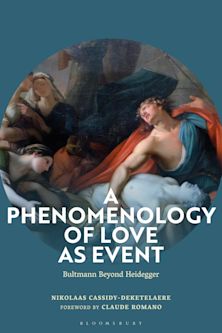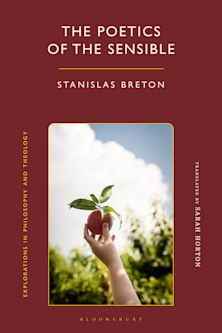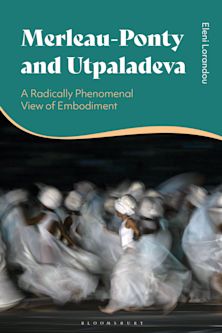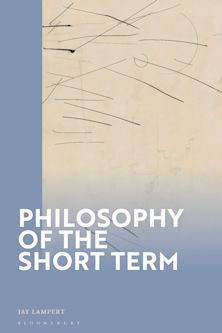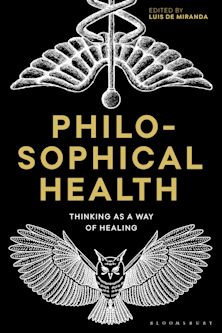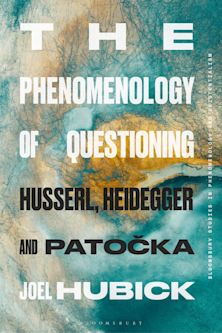- Home
- ACADEMIC
- Philosophy
- Phenomenology
- The Ontological Roots of Phenomenology
The Ontological Roots of Phenomenology
Rethinking the History of Phenomenology and Its Religious Turn
The Ontological Roots of Phenomenology
Rethinking the History of Phenomenology and Its Religious Turn
This product is usually dispatched within 2-4 weeks
- Delivery and returns info
-
Flat rate of $10.00 for shipping anywhere in Australia
You must sign in to add this item to your wishlist. Please sign in or create an account
Description
In The Ontological Roots of Phenomenology: Rethinking the History of Phenomenology and Its Religious Turn, Anna Jani examines the common methodological background of phenomenology. Through attention to the phenomenon of being, the existential experience of religiosity can be phenomenologically described by the ontological difference between being and beings. Jani demonstrates that the methodological inquiries connect closely with the ontological source of phenomenology. First, she elaborates on the contributions of Hedwig Conrad-Martius, Roman Ingarden, and Edith Stein from the point of view of Heidegger’s influence on the early phenomenologists from Husserl’s students. Second, she analyzes Heidegger’s reinterpretation of his own earlier thinking after the “turn,” which is formulated in the idea of the “new beginning of philosophical thinking” in the Contributions to Philosophy. In the context of clarifying the difference between being and beings, her third hypothesis about Ricœur’s critique of Heidegger reveals an ethical level. The primordiality of the ethical dimension of the action reveals the ontological foundation of the hermeneutical-phenomenological situation.
Table of Contents
Part 1: Ontological Approaches in Early Phenomenological Thinking
1.First Considerations
2.New Ways in Phenomenological Thinking
Part 2: The Experience of Being and the Problem of the Historical Being
3.The Existentiality and Temporality of Dasein
4.The Actuality of the Event and Its Relation to the Temporality of Being
Part 3: The Methodological Consequences of the Questioning on Being
5.The Origin of the Ontological Difference
6.The Truth of Beyng and the Truths of Being
Part 4: Final Considerations
Conclusion
Bibliography
Product details
| Published | 09 Feb 2022 |
|---|---|
| Format | Hardback |
| Edition | 1st |
| Extent | 266 |
| ISBN | 9781793649003 |
| Imprint | Lexington Books |
| Dimensions | 227 x 160 mm |
| Series | Continental Philosophy and the History of Thought |
| Publisher | Bloomsbury Publishing |
About the contributors
Reviews
-
Anna Jani’s The Ontological Roots of Phenomenology: Rethinking the History of Phenomenology and Its Religious Turn is a synthesis of traditional scholarship, contemporary philosophy of religion, and open-minded philosophical reasoning. On the complex scene of contemporary phenomenological trends, Anna Jani focuses on the ontological question before and after Edmund Husserl’s philosophy. She points out that phenomenologies of religion—from Adolf Reinach through Edith Stein to Paul Ricœur—underpinned various efforts to reestablish the ontological commitment of phenomenology. Hermeneutics appears in this context as the method of finding the ontological roots of phenomenology from Dilthey to Dan Zahavi. With her fresh and deep work Anna Jani continues her explorations of the varieties of religious experience and assists the reader with new motivations to continue this path of research. Her overarching understanding of the history and the problems of phenomenology and hermeneutics helps the readers understand the contemporary philosophical situation in and beyond Continental Thought.
Balázs M. Mezei, Corvinus University
-
This book begins with Paul Ricouer’s hermeneutics and has its conclusion in it. In the middle we find a description of the main thinkers in early phenomenology: Edmund Husserl, Edith Stein, and Hedwig Conrad-Martius on one side, and Martin Heidegger on the other side. To the latter, the author dedicates her major reflections, her pivotal argument being the question of ontology.
In this way a path is sketched that leads from the 'classic' phenomenology to hermeneutics. Along this path many important aspects of the thinkers are pinpointed; the book is useful to understand the different senses in which phenomenology can be considered.Angela Ales Bello, Pontifical Lateran University
-
This book discusses the relationship between phenomenology and the question of being as it unfolded among the protagonists of the early phenomenological movement. By doing so three thinkers become visible as important for understanding the polarization between Husserlian and Heideggerian versions, namely Hedwig Conrad-Martius, Roman Ingarden, and Edith Stein. The upshot is a much better grasp of what the question of being in fact involves and thus also of phenomenology and of the phenomenological tradition. It is a very intelligent book bound to mark the debate in coming years.
Mette Lebech, Maynooth University
-
In this richly textured work, Anna Jani advances an original and compelling argument to re-assess the ontological impulse animating the development of phenomenological thinking, beginning with, but not exhausted by, its Husserlian inauguration. With a sweeping view of diverse phenomenological thinkers— Husserl, Heidegger, Stein, Ricoeur, Conrad-Martius and others—Jani demonstrates the centrality of the question of reality, and hence, an ontological field of concern, for the methodological conception of phenomenology. From this perspective, Jani deftly reconstructs the conceptual itinerary from Husserl’s earliest interest in ontology through Heidegger’s radical transformation of ontological thinking into a historical adventure to Ricoeur’s attempt at a hermeneutical reconciliation of the divergent tendencies animating phenomenological philosophy. Through-out this work, lesser known thinkers, most notably Edith Stein and Hedwig Conrad-Martius, are rightly given their due in the phenomenological battle of the giants on the sense of what it is to be.
Nicolas de Warren

ONLINE RESOURCES
Bloomsbury Collections
This book is available on Bloomsbury Collections where your library has access.












